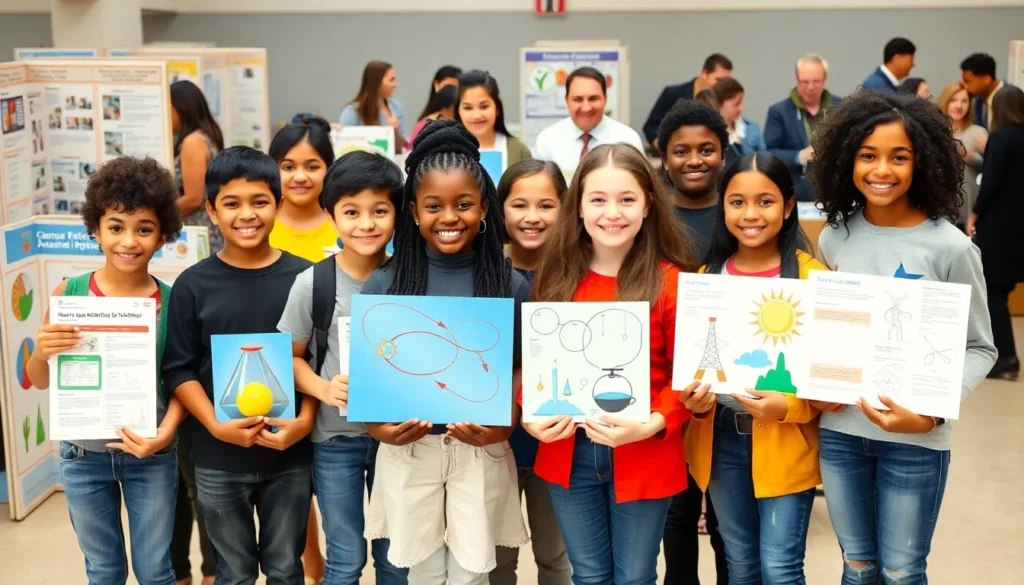In a world where late-night study sessions and caffeine-fueled cramming reign supreme, student achievements shine like diamonds in the rough. These accomplishments aren’t just about grades; they’re the moments that make parents beam with pride and teachers shed a happy tear. From science fairs to debate championships, students are proving that hard work and determination can lead to some seriously impressive feats.
Table of Contents
ToggleUnderstanding Student Achievements
Student achievements encompass various milestones reached by learners in academic and extracurricular settings. These accomplishments reflect individual growth, skills acquired, and the hard work invested by students.
Definition of Student Achievements
Student achievements include academic performance, participation in sports, and success in creative endeavors. Accomplishments can range from earning high grades to winning competitions or completing significant projects. These milestones demonstrate a student’s commitment and engagement in their educational journey, providing a clear indication of their skills and perseverance. Recognizing these achievements extends beyond grades; it highlights the student’s ability to overcome challenges and excel in different areas.
Importance of Recognizing Achievements
Recognizing student achievements fosters motivation and boosts self-esteem. When accomplishments are acknowledged, students feel valued and inspired to strive for more. Celebrating successes also engages parents and educators in the learning process, creating a supportive environment. Increased morale leads to enhanced participation and a sense of community within schools. Ultimately, seeing the recognition of their efforts encourages students to develop a lifelong passion for learning and personal development.
Factors Influencing Student Achievements

Student achievements stem from various factors that significantly shape their educational journeys. Understanding these influences can help enhance overall performance.
Academic Support Systems
Support systems within educational institutions play a crucial role in student achievements. Teachers provide essential guidance through tailored instruction and feedback, aiding students in grasping complex concepts. Counselors contribute by offering resources for academic planning, ensuring students are on track with their goals. Peer tutoring programs create collaborative environments, encouraging knowledge sharing and proficiency in subjects. Access to technology and study materials enhances learning experiences, promoting engagement and understanding.
Extracurricular Activities
Extracurricular activities enrich student life and foster achievements beyond academics. Participation in clubs and sports builds teamwork and leadership skills. Students engaged in community service develop a sense of responsibility and empathy, impacting their personal growth. Competitions such as science fairs and debate tournaments encourage critical thinking and innovation. These experiences not only enhance skills but also boost self-esteem and motivation, propelling students toward future success.
Measuring Student Achievements
Measuring student achievements involves various assessment methods that provide insights into their progress and skills. These methods encompass standardized testing and alternative assessment techniques.
Standardized Testing
Standardized testing serves as a common benchmark for evaluating student performance across different regions. These tests track knowledge in subjects like math and reading, offering a clear comparison among students. Performance on standardized tests reflects not only academic strengths but also areas needing improvement. Many educational institutions utilize this data to inform curriculum decisions and teaching strategies. Results from these assessments play a crucial role in accountability measures for schools, helping identify successful programs or those that require enhancement.
Alternative Assessment Methods
Alternative assessment methods offer valuable insights into student achievements through diverse approaches. Portfolio assessments, project-based evaluations, and presentations allow students to showcase their skills in practical contexts. These methods emphasize creativity, critical thinking, and real-world applications. By incorporating peer assessments and self-evaluations, students gain a deeper understanding of their learning process and outcomes. Schools increasingly adopt these approaches, recognizing their potential to foster engagement and provide a more holistic view of student progress.
Case Studies of Notable Student Achievements
Students continue to achieve remarkable milestones, showcasing their talents and commitment. Below are two key areas where these achievements manifest prominently.
Academic Excellence
In numerous high schools, students excel in advanced placement (AP) courses, often earning college credits. For example, a group of five students at Lincoln High School scored a perfect 5 on their AP Calculus exam. This accomplishment demonstrates their mastery of complex concepts. At the state level, students frequently participate in science fairs, with many projects earning top awards. The regional science fair recently saw three students from Maplewood Middle School win scholarships for innovative environmental solutions. Such achievements not only highlight academic success but also set a foundation for future opportunities.
Community Engagement
Community service continues to be a powerful tool for student development. In Chicago, students from Roosevelt High School organized a food drive, collecting over 2,000 pounds of non-perishable items for local shelters. Each student’s effort played a vital role in this success. Another exemplary case involves the student council at Green Valley Academy, which raised $5,000 for a local children’s hospital through a charity run. Engagement in these initiatives fosters leadership skills and cultivates a sense of responsibility. Students who invest time in their communities often develop a deeper understanding of social issues, preparing them for future challenges.
Student achievements represent a tapestry of hard work determination and growth. They extend beyond grades to encompass valuable life skills and experiences that shape future leaders. Recognizing these milestones not only enhances motivation but also fosters a supportive learning environment where students thrive.
As students celebrate their successes whether in academics or extracurricular activities they build confidence and a passion for lifelong learning. Each achievement serves as a stepping stone toward greater aspirations and a testament to the power of perseverance. By nurturing these accomplishments schools parents and communities can inspire the next generation to reach even greater heights.





